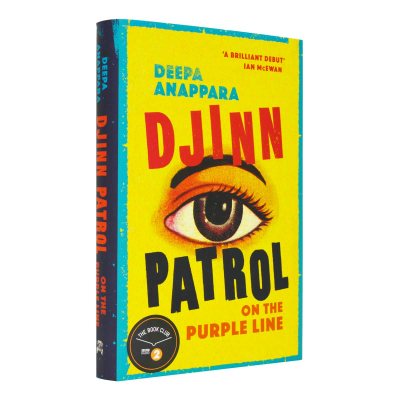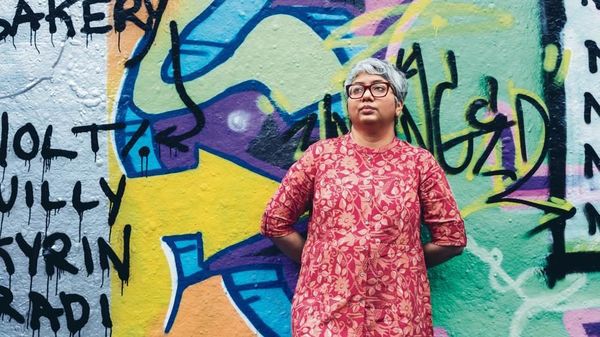
Book Review of Djinn Patrol on the Purple Line by Deepa Anappara
The story, Djinn Patrol on the Purple Line, shares the events prior to and following the disappearance of several children who go missing in a slum area of India. It is a powerful story with beautifully drawn characters, revealed to us from the perspective of nine year old Jai, The ‘Afterword’ provides factual context and tells us that up to 180 children go missing every single day in India. This turns a poignant and moving work of fiction into a tragic insight into reality. In fact, I can’t think of a book with a more powerful ‘Afterword’ in any work of fiction I’ve come across.
Having a child narrator in fiction can be problematic. They are required to share with the reader that which is likely to be beyond their own sphere of understanding. Anappara manages to combine a childlike narration of a nine year old with an omniprescent narration brilliantly, without any jarring of purpose and voice. The reader can share Jai’s excitement regarding ‘solving a mystery’ whilst simultaneously empathising with his parents fear and despair about any harm coming to their children.
There is a sense of inevitability and loss that pervades the text. The circumstances leading to the abduction of Runu-Didi is particularly powerful and enlightening, as it explores how she sees her own role as a female growing up in contemporary India. The structural and narrative changes of these interspersed chapters work extremely well as a tool for exploring social, economic and political issues.
There is nothing romantic about Djinn Patrol on the Purple Line. It doesn’t have a happy ending and praying to ‘Mental’ isn’t effective. Nevertheless, it isn’t lacking in hope and is an exquisite observational account of humanity.

Book Discussion Questions for Djinn Patrol on the Purple Line by Deepa Anappara
Discuss the title of the book. Why is the story called Djinn Patrol on the Purple Line?
Why did Runu-Didi stay in a quiet and deserted area of the basti?
Were you surprised by the level of corruption in Jai’s neighbourhood?
After the events of the novel Faiz’s family decide to move to a different neighbrouhood with more Muslim and less Hindi residents. Around the same time Pari wins a scholarship to a ‘better’ school and leaves the neighbourhood. What is Anappara telling us by including these details?
The character Quarter is in the ‘background’ of the novel throughout, largely presented as a sinister figure. What is your opinion of him and what is his role in the novel?
At what point in the novel did you work out who was abducting the children?
What did you find the most brutal observation within the book?
If you were to write or read a sequel to the book what would happen to Faiz, Jai and Pari?
The first chapter begins with ‘This story will save your life’. On a first reading did you find the opening difficult to understand? If so why? How do you interpret the opening chapter having read the whole book?
What genre do you think Djinn Patrol on the Purple Line is?
If Djinn Patrol on the Purple Line was a film what child actor (past or present) would you allocate the key roles to?
Bookclub Questions for Djinn Patrol on the Purple Line (if you haven't read the book!)
What other books have you read with a child narrator? Did you enjoy them and why or why not?
The book uses several Hindi terms that might need translating to someone living outside of India or not familiar with Hinduism. Do you like books to have a glossary in cases where authors make an active choice to use language specific to a place or culture? Is this question negatively indicative of Western bias?
Do you believe in Djinns?
In Djinn Patrol on the Purple Line some of the parents and siblings blame themselves for the disappearance of their families. This is the case, for example, with Chandni who wants to make the night better for her family by buying sweet treats so venturing out in the dark. How quick are you to take the blame for things that you are not necessarily able to prevent from happening?
Djinn Patrol on the Purple Line begins by saying ‘This story will save your life’. Have you read a book that have massively impacted your own lives? How and why has it been important to you?
Share with the group any books by other Indian authors or books set in India that you would like to recommend. What did you enjoy about them?
Personal Reflection based on Deepa Anappara's Djinn Patrol on the Purple Line
In the very dim and distant past I, and my now husband, spent several months back-packing in India. Our budget was tiny and we stayed in many ‘low end’ hostels. We met a lot of local people, travelled the length of the country by train and had a lot of experiences – good and bad. This was all with the knowledge that if the chips were really down then we could fly home. We loved the trip and India has remained a special place in our hearts.
Reading Djinn Patrol on the Purple Line brought back so many memories, smells, tastes, insights and love for this vibrant country. Over and above this made me, for the first time, reflect on the arrogance and sense of entitlement I had during our visit. I’m finding it difficult to express what I mean but I know that I’m currently feeling ashamed of how little I even really tried to understand the country and the people from a perspective other than my own. Reading Djinn Patrol made India real to me in a way that my extended visits to it didn’t. I can now make connections to what I saw and experienced, enabling me to try and move beyond a subconscious post-colonial bias that I didn’t even realise I had. This, I hope will positively influence my future attitude and outlook and make me just a little bit less egotistical and self-centred in how I perceive people and places outside of my norms. For this, I thank Deep Anappara.. Djinn Patrol is one of the most powerful pieces of fiction I’ve read. I’m putting it right up there with Bernadine Evaristo’s Girl, Woman, Other for great books I’ve read this year!